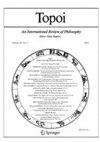我们所知道和不知道的共同注意力
IF 1.3
2区 哲学
0 PHILOSOPHY
引用次数: 0
摘要
共同注意是一种早期出现的独特的人类能力,它是人类许多其他能力的基础,如语言和理解他人的思想。在这篇文章中,我总结了发展学家和哲学家们关于共同注意的发现,最后我指出了共同注意的两个问题或问题需要进一步的研究:1)共同注意与幼儿二元分享或情感交换技能之间的关系,以及2)共同注意的进化。本文章由计算机程序翻译,如有差异,请以英文原文为准。
What We Do and Don’t Know About Joint Attention
Abstract Joint attention is an early-emerging and uniquely human capacity that lies at the foundation of many other capacities of humans, such as language and the understanding of other minds. In this article, I summarize what developmentalists and philosophers have come to find out about joint attention, and I end by stating that two problems or questions of joint attention require additional research: 1) the relation between joint attention and the skills for dyadic sharing or affect exchange in young infants, and 2) the evolution of joint attention.
求助全文
通过发布文献求助,成功后即可免费获取论文全文。
去求助
来源期刊

TOPOI-AN INTERNATIONAL REVIEW OF PHILOSOPHY
PHILOSOPHY-
CiteScore
3.10
自引率
7.10%
发文量
47
期刊介绍:
Topoi''s main assumption is that philosophy is a lively, provocative, delightful activity, which constantly challenges our received views, relentlessly questions our inherited habits, painstakingly elaborates on how things could be different, in other stories, in counterfactual situations, in alternative possible worlds. Whatever its ideology, whether with the intent of uncovering a truer structure of reality or of soothing our anxiety, of exposing myths or of following them through, the outcome of philosophical activity is always the destabilizing, unsettling generation of doubts, of objections, of criticisms. It follows that this activity is intrinsically a ''dialogue'', that philosophy is first and foremost philosophical discussion, that it requires bringing out conflicting points of view, paying careful, sympathetic attention to their structure, and using this dialectic to articulate one''s approach, to make it richer, more thoughtful, more open to variation and play. And it follows that the spirit which one brings to this activity must be one of tolerance, of always suspecting one''s own blindness and consequently looking with unbiased eye in every corner, without fearing to pass a (fallible) judgment on what is there but also without failing to show interest and respect. Topoi''s structure is a direct expression of this view. To maximize discussion, we devote most or all of this issue to a single topic. And, since discussion is only interesting when it is conducted seriously and responsibly, we usually request the collaboration of a guest-editor, an expert who will identify contributors and interact with them in a constructive way. Because we do not feel tied to any definite philosophical theme (or set of them), we choose the topic with absolute freedom, looking for what is blossoming and thriving, occasionally betting on what might - partly through our attention - ''begin'' to blossom and thrive. And because we do not want our structur e to become our own straightjacket, we are open to contributions not fitting the ''topos'', and do not rule out in principle the possibility of topic-less issues.
 求助内容:
求助内容: 应助结果提醒方式:
应助结果提醒方式:


